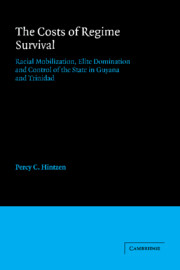 The Costs of Regime Survival
The Costs of Regime Survival Book contents
- Frontmatter
- Contents
- Acknowledgements
- 1 Regime survival and control of the post-colonial state
- 2 Mobilization for control of the state in Guyana and Trinidad
- 3 Maintaining control of the state: strategies for regime survival in Guyana and Trinidad
- 4 Elite support and control of the state: race, ideology,and clientelism
- 5 Regime survival and state control of the economy
- 6 The political and economic costs of regime survival
- 7 Collective needs versus the demands of powerful actors in less developed countries
- Appendix
- Bibliography
- Index
- Other books in the series
6 - The political and economic costs of regime survival
Published online by Cambridge University Press: 08 October 2009
- Frontmatter
- Contents
- Acknowledgements
- 1 Regime survival and control of the post-colonial state
- 2 Mobilization for control of the state in Guyana and Trinidad
- 3 Maintaining control of the state: strategies for regime survival in Guyana and Trinidad
- 4 Elite support and control of the state: race, ideology,and clientelism
- 5 Regime survival and state control of the economy
- 6 The political and economic costs of regime survival
- 7 Collective needs versus the demands of powerful actors in less developed countries
- Appendix
- Bibliography
- Index
- Other books in the series
Summary
The state has emerged almost universally in less developed countries as the key, paramount, and oftentimes sole functional unit for the satisfaction of the collective needs of society, namely: social order and stability, self-sustaining economic development, equity in the allocation of valued ends, social security of the population, and civil and political rights. At the same time, the state has become the primary and most often the sole allocator of economic and social values, the central institution of economic accumulation for individuals and groups, and the preeminent instrument of power. It is one of the central theses of this book that, under certain conditions, regime survival can become most intricately tied to these latter set of functions in ways which jeopardize realization of the former.
If it is to ensure its own survival, a regime might find itself with little choice but to allocate resources and to satisfy the accumulative demands of powerful individuals and groups in ways which render the realization of the collective needs of society highly unlikely. To deal effectively with the consequences of this, a regime might be forced to employ the state for coercion, control, and surveillance to contain the effects of social, political, and economic crisis and to prevent destabilizing anti-regime mobilization.
Collective needs can be sacrificed without jeopardizing regime survival. This is because of the contrasting role that the state plays for different sectors of society. For the masses, the reality of the state is its preponderant function as an allocator of economic and social values.
- Type
- Chapter
- Information
- The Costs of Regime SurvivalRacial Mobilization, Elite Domination and Control of the State in Guyana and Trinidad, pp. 165 - 199Publisher: Cambridge University PressPrint publication year: 1989
